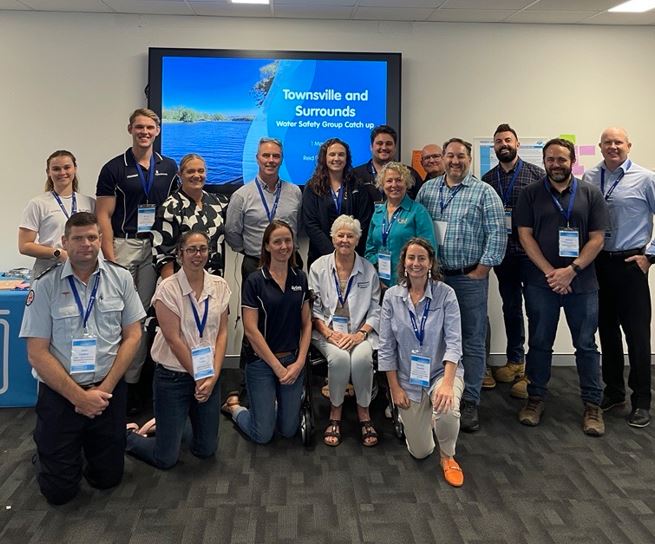Published 20 May 2024
Two years after the launch of the Townsville Water Safety Strategy, a multisectoral group of drowning prevention advocates convened to check in on progress towards key activities outlined in the strategy, discuss region-specific drowning prevention issues and actions, and chart a path for future collaboration. The meeting was hosted by Townsville City Council at the Ried Park Precinct and facilitated by Royal Life Saving Society – Australia.
Key Items Discussed
In a session focused on updates, emerging trends, and future challenges, attendees discussed a variety of issues from multiple different perspectives that they saw as critical water safety issues for the region. Some of the topics discussed included:
- A lack of parent supervision at aquatic facilities and beaches, presenting ongoing challenges for lifeguards.
- Increased numbers of snorkelers at Alma Bay, with many unfamiliar with the area and having low competence in the water.
- New marine safety services with roving jet ski patrols to cover additional areas.
- Reflections on flooding from Tropical Cyclone Kirrily and other weather events.
- Research on and responses to marine envenomation events.
- Safety at hotels, motels, and short-term rentals; specifically, in regard to: 1.) alcohol at these locations, and 2.) vacation properties’ safety features and suitability to host children.
- Dam safety, in relation to regulation of large dams, emergency action plans for dams, and safety resources and communications for dams on private property.
- The need for ongoing prevention efforts in partnership with tour operators, as opposed to reactionary response when something goes wrong.
- Financial pressures are forcing families to forgo swim lessons, which is a major concern as children are not learning the skills they need.
- Swim lesson operators including more water safety focused material for participants and their parents.
- Gaps between metro and regional areas in terms of access to swim lessons, water safety education, aquatic facilities, lifeguard training.
- Overall workforce shortages for lifeguards and swim teachers.
Local Activities & Actions
The group also spent time assessing progress towards key activities in the Townsville Water Safety Strategy, highlighting several drowning prevention efforts ranging from programs to communication initiatives to the installation of barriers and additional signage. Focused on prioritising the most important focus areas from the strategy, the group highlighted regional and remote communities, alcohol use around the water, older adults, parents with young children, the concerning lack of swimming and water safety skills, and the need to tailor programs for culturally and linguistically diverse communities.
Next Steps
In terms of ongoing collaboration, attendees affirmed their interest and the value in continuing to work together to advance drowning prevention in the region. Of note, several people commented on the benefit of learning about what others were doing, meeting new people, and aligning work and activities where possible. The group committed to the following initiatives:
- Further exploration of establishing a coalition or network focused on drowning prevention in the region. One question is what the group should be called, a conversation to be advanced over email and with a short form for input.
- An online meeting on July 2nd at 2:00PM to provide updates and discuss coordinated communication efforts for July 25th – World Drowning Prevention Day.
- An online meeting on October 1st at 2:00PM to provide updates and discuss coordinating efforts for December 1st – National Water Safety Day.
- An in-person meeting in April/May of 2025, with specific goals and objectives TBC.
For additional information on drowning prevention activities in Townsville or logistics for the upcoming online meetings, please email Will Koon, RLSSA National Manager – Drowning Prevention Strategy: wkoon@rlssa.org.au

